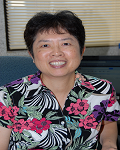Breadcrumb

Dr. Phoebe McLaughlin

Research Areas: Probability and Statistics, Financial Mathematics, Semigroups, and Taxicab Geometry
Dr. McLaughlin received her BA in Library Science from the National Taiwan University in 1981. She earned her MS and Ph.D. in Mathematics from the University of Iowa in 1987 and 1991, respectively. Dr. McLaughlin joined the School of Computer Science and Mathematics as an assistant professor in 1991 and was promoted to full professor in 2001. She serves presently as the Assistant Chair of the mathematics programs and the coordinator of the Actuarial Science and Statistics Program.
In the early years of her academic career, Dr. McLaughlin worked on problems in semigroups and taxicab geometry. Then she developed interest in probability, statistics, and financial mathematics. She is the Secretary and Treasurer of the Mathematical Association of America Missouri Section and the Algebra Editor of the Missouri Journal of Mathematical Sciences.
Dr. McLaughlin has also been interested in redesigning the delivery format of the developmental and first year level math courses in order to improve student performance and retention in mathematics. She supervises and coordinates Intermediate Algebra, general education and developmental mathematics courses, and dual credit math courses. Dr. McLaughlin serves as a Redesign Scholar for the National Center for Academic Transformation, providing one-on-one assistance and consultation to colleges and universities interested in redesigning mathematics courses. She is on the Missouri Math Pathways Taskforce. Charged by the Missouri Department of Higher Education in 2015, the committee has explored and identified entry-level mathematics pathways aligned with targeted programs of study. The goal is increase student success rates in mathematics gateway courses and the percentage of students completing degree programs.








